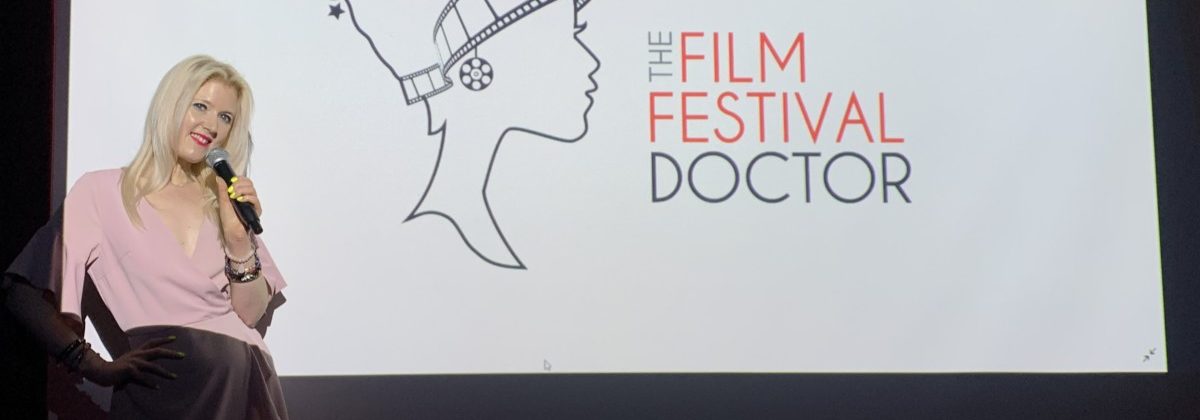The Film Festival Doctor (Yes, she’s a real doctor!) Dr. Rebekah Louisa Smith, shares with you today the secrets behind how to create a streamlined and focused film festival strategy. As discussed last week the ‘Stay At Home’ orders of the CV19 pandemic have helped a lot of creatives become extremely productive and an abundance of writing has occurred, resulting in more films going into production ready for when filming can begin again.
Before completing any film festival submissions, as discussed last week, the first golden rule is know your film inside out and to identify if you have a ‘festival film.’ Once you’ve done that and you have a festival viable film that is ready to submit to film festivals the next question is ‘Which Festivals Should I Submit My Film To?’
This is a big question which needs to be broken down into bite size chunks, as then you’ll get the answers you’ll need. Its not that difficult to achieve either when you follow my guidelines below 😊
The first step is to do your research and look online at previous festival programmes. Start by making a note of the themes and types of films which these festivals tend to screen. Review the trailers to these films on you tube etc.
Look at the content contained within the festivals programme – what type of genre and narrative themes are they selecting? Also review their mission statements as these are the places where they tell you what types of films they’re looking for.
For example, The London Short Film Festival have a programme called ‘God’s Lonely Men’ which is a programme focused upon men’s problems and male life struggles. This is one of their themes and they are looking for innovative films which could fit this theme – if your film focuses upon a male struggling with a male issue (such as depression or a male-only health issue) therefore it’s certainly a festival to add to your strategy.
Good places for you to research (besides google) are filmfreeway.com (always take a look at their reviews section and their top 100 best reviewed festivals), movie maker’s top 50 film festivals worth their entry fee – this is a top 50 list which is updated each year (https://www.moviemaker.com/50-film-festivals-worth-the-entry-fee-in-2019/), festivalfocus.org and PDF’s of BAFTA, BIFA & Oscar qualifying festivals are also available on the internet (again google is your friend to find them) to download for free. It is also worth researching on-line via social media Facebook pages of the festivals as these are very informative.
When doing your research keep asking yourself the following questions – do I have a film for this festival’s audience? What value could my film add to this festival? How could I form a long-term partnership with this festival and keep coming back as an alumni to showcase my work and growth as a filmmaker?
Below are several quotes from 3 film festival directors which offer further insight into what film festivals are looking for and what goes on behind the scenes during their selection process –
- Steffanie L. Finn, Executive Director of the Winter Film Awards Festival, New York City
‘The Winter Film Awards International Film Festival takes submission judging very seriously. We have a team of about 75 judges from around the world who watch about 2 1/2 hours of films per week and score them overall plus in 8 technical areas.
Each submission is watched by at least two men and two women. If the judges do not agree on a film, it is assigned to two additional judges. All judges scored are rolled up and we select roughly the top scoring 10-12 films in each category.
The most important things a filmmaker can do to impress a submissions judge is to ensure the sound is absolutely top-notch. Juries are forgiving of less than perfect acting, lighting or cinematography, but even the best film in the world will be turned off within a few minutes if the sound is bad. Also, very important is to ensure your subtitles are accurate, legible, do not cover any important action and are on-screen long enough to actually read.’
Here is a link to read Steffanie’s primary advice for filmmakers –
- Stephen Savage, Founder and Director. Idyllwild International Festival of Cinema, California
‘As the founder and director of the Idyllwild International Festival of Cinema, heading into its 12 year in March of 2021, I’m in the unique position of being a working Hollywood filmmaker who has the honour each year of viewing hundreds of film submissions from around the globe. I have to say, the South African feature film, Losing Lerato, which won the top awards at our 2020 festival, is a prime example of what we at Idyllwild (and most film festivals I would think) look for in projects we invite to screen with us. The first is quality overall. In other words, we seek films which “look” like big screen releases. Losing Lerato had the look and feel of a bigger budget movie, though we understood it was not. Technology has made it so a film can be shot with a movie look although just because a film looks ok, there is so much more to making a professional film than that. Acting, editing, sound and score… all of these the filmmaker must be passionate about and willing to spend the time on in order to generate interest from popular film festivals and markets. Whether it’s a feature, a short, or a documentary, don’t sell your passion short by rushing it through. Cast it, film it, and work your post as if your life depends on it.’
- John Currie, Festival Director of the Beeston Film Festival, U.K.
‘The Beeston Film Festival employs a rigorous and openminded selection process. We request submissions across a wide range of genres, ensuring a diverse programme, however the joy of the festival is surprise! We of course objectively assess each submission against criteria such as cinematography, script and performance, but it is films such as The Cunning Man, that combine high performing technical elements with originality that stand out. Festival selections and award nominations are determined by our local Programming Team, whilst award decisions are driven by our international industry panel.’
As always, I love helping my filmmakers create their festival strategies and this is something that I’d love to help you with. Download your free guide ‘The 4 Main Reasons Why Your Film Is Not Getting Accepted Into Film Festivals And How To Fix it’
Coming Next Week: I chat with the very talented U.K. Director Martin Gooch about the reasons why he is not a fan of on-line film festivals and why the live film festival model will always be irreplaceable.




